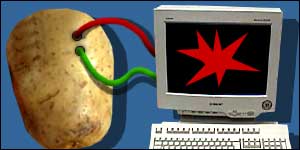| Front Page World UK UK Politics Business |
| Sci/Tech |
| Health Education Sport Entertainment Talking Point In Depth AudioVideo |

UK technology enthusiasts have found a way to power a computer using potatoes.
The computer fans, who run a website called Temple ov thee Lemur, decided to build the spud server because someone bet them that it could not be done.
Although science kits that power a digital clock off a potato or two are available, few people have tried anything larger.
Steve Harris, spokesman for the group, said to lighten the load on the potato power pack the group had first to make a low power version of a web server.
Surfers limited
These computers are usually powerful, high-memory versions of the PCs people have on their desks. But there was no way a bag of potatoes would provide enough power for one of those, said Mr Harris.
 The potatoes in action
|
Even this small server needs around 12 potatoes to power it and the spuds have to be changed every couple of days.
Each potato generates about half a volt. The web pages hosted by the server can be browsed but the machine limits the number of people that can view it every minute to ensure it is not overwhelmed.
Limited hardware
Potatoes can be used as batteries because the flesh of the vegetable acts as a very thick electrolyte - like the acid in a car battery.
When electrodes made of zinc and copper are stuck into the potato the electrochemical reaction produces a power flow. The salty flesh of the potato allows ions to cross from one electrode to another.
Pictures of the potato-powered server are available but Mr Harris said they were taken when the system was not switched on. "The power connectors were plugged in the wrong way round and it would have been fatal to the hardware if it had been live," he said.
The spud server is the latest in a series of attempts by technology fans to get the most out of very limited hardware.
A Dutch company is making web servers using old Commodore 64 computers that were popular in the mid-1980s. Several web servers are run off old Amiga computers and there is even a project to turn hand held computers such as the Palm into low volume web servers.
| Search BBC News Online |
||
Advanced search options | ||
The BBC is not responsible for the content of external internet sites